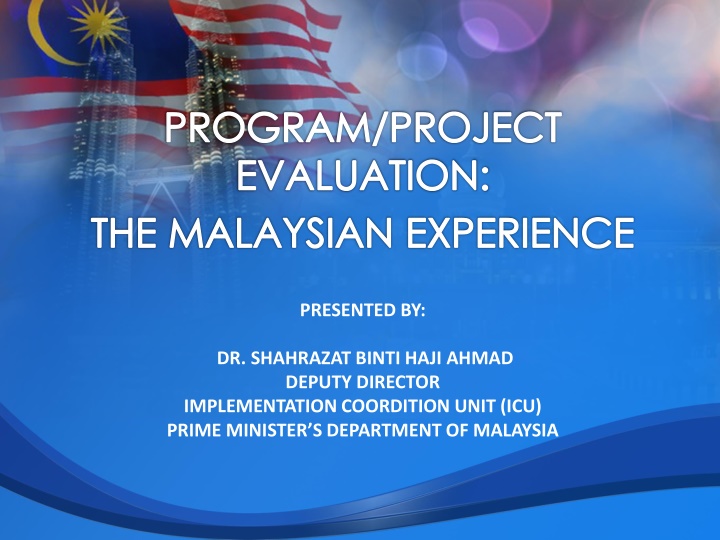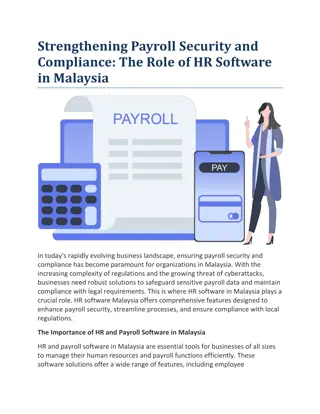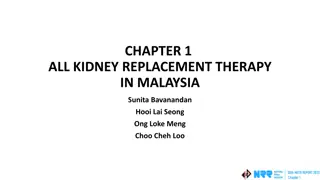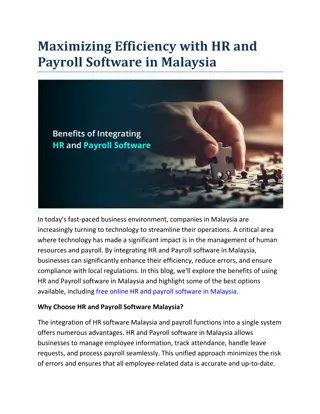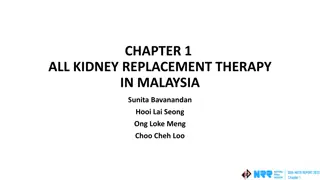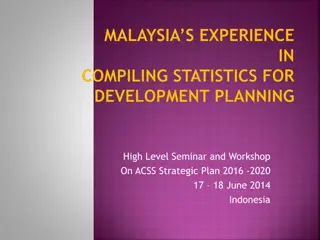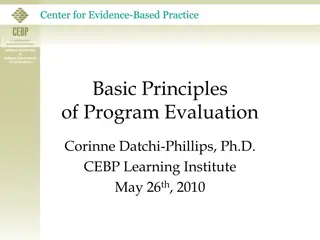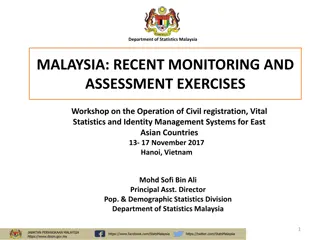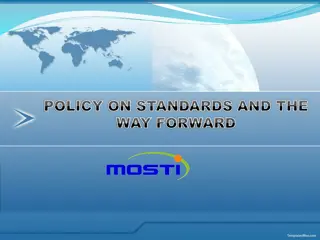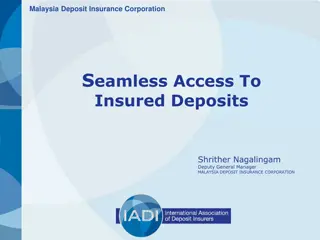Enhancing Program and Project Evaluation: Insights from Malaysia
In the presentation by Dr. Shahrazat Binti Haji Ahmad, Deputy Director of the Implementation Coordination Unit at the Prime Minister's Department of Malaysia, the focus is on the importance of outcome-based approaches in evaluating program and project performance. The Malaysian government emphasizes value for money, efficiency, and effectiveness in service delivery, development projects, and national security maintenance. Key areas include poverty eradication, public safety, education, and infrastructure development, with a framework involving various governmental levels and key drivers for outcome evaluation. The Implementation Coordination Unit has developed guidelines for conducting development program evaluations at the federal government level.
Download Presentation

Please find below an Image/Link to download the presentation.
The content on the website is provided AS IS for your information and personal use only. It may not be sold, licensed, or shared on other websites without obtaining consent from the author.If you encounter any issues during the download, it is possible that the publisher has removed the file from their server.
You are allowed to download the files provided on this website for personal or commercial use, subject to the condition that they are used lawfully. All files are the property of their respective owners.
The content on the website is provided AS IS for your information and personal use only. It may not be sold, licensed, or shared on other websites without obtaining consent from the author.
E N D
Presentation Transcript
PROGRAM/PROJECT EVALUATION: THE MALAYSIAN EXPERIENCE PRESENTED BY: DR. SHAHRAZAT BINTI HAJI AHMAD DEPUTY DIRECTOR IMPLEMENTATION COORDITION UNIT (ICU) PRIME MINISTER S DEPARTMENT OF MALAYSIA
1 Malaysia, People First, Performance Now THE MALAYSIAN EXPERIENCE IN PROGRAM/PROJECT EVALUATION
INTRODUCTION The basic role of the government: to provide for efficient and effective delivery of services, implement development project and maintain the national security The need to deliver development projects - value for money and fit for purpose Emphasis from output-based to outcome-based approach Performance measurement must be evaluated to ensure the implementation meets the expected result and desired outcomes Enhancement on the Project Management Cycle by embarking on Outbased Based Approach in planning and Outcome Based Budgeting in implementation and evaluation stage.
| U n i t P e n y e l a r a s a n P e l a k s a n a a n | FRAMEWORK NATIONAL STATE DISTRICT Poverty eradication programs Local Authority service delivery Poverty eradication programs Public facilities and amenities Social harmony Crime prevention Public Safety Corruption Education Low Income Household Urban Public Transport Rural Basic Infrastructure KEY RESULT AREA National agenda Cross cutting programs National & public priorities Great impacts High investment Inter agencies programs State priority programs Priority for programs/projects costing RM10 milion and above Inter departmental projects Immediate outcomes Direct benefits DESCRIPTION Chief Minister State Excos State s Secretaries Heads of Departments District officers Heads of Departments Head of Villages Ministers Chief Secretary DG of Central Agencies Ministries Sec. Gen. KEY DRIVERS Outcome evaluation as a mandatory agenda for MTNg and JKTNg State to identify minimum of 10 priority programs/projects Regular reporting to MB s Council and JKTN KPI for the Key Drivers Outcome evaluation as a mandatory agenda for MTN, MB s Council, JKTN and JTPK Ministries to identify programs/projects Regular reporting to Cabinet KPI for the Key Drivers Outcome reporting to JKTD Regular reporting to MTNg and JKTNg KPI for the Key Drivers INITIATIVES | U n i t P e n y e l a r a s a n P e l a k s a n a a n |
IMPLEMENTATION COORDINATION UNIT (ICU) Implementation (ICU JPM) has compiled and produced Guidelines in Conducting Development Program Evaluation - Federal Government Circular No. 3, 2005. Role of ICU JPM are: To monitor and coordinate performance indicators at national level. To monitor and coordinate program evaluation at ministries level. To conduct selected program evaluation. To submit and present evaluation reports to National Action Working Committee and National Action Council. To ensure that program/project are implemented consistently all levels. Coordination Unit, Prime Minister Department ICU JPM being the secretariat for both Committee and National Action Council meetings will act as the clearing house for all evaluation exercise conducted by the ministries and state governments. National Action Working
MILESTONE: THE EVALUATION PATH 2005 2006 2007-2010 2009 2010 REPORTING/ REVIEWING PLANNING ENFORCEMENT ROLLING ENHANCEMENT 8,343 programs/ projects have been evaluated. Outcome Evaluation Modul was developed and incorporated into the Project Monitoring System. Enforcement/ application to all head of division Designing the Guideline Circular Ministries/ Agencies/ Statutory Bodies embarked on the evalution program by: Officiating the Development Program Evaluation Guideline Circular on August 24, 2005. Assesment reports (aggregated according to ministries) sent to Public Service Department. Training sessions conducted through conferences, workshops, bilateral with ministries/ agencies. Evaluating the completed projects to identify the outcome and impact. Presenting the papers in the respective forums. Evaluation results presented to stakeholders. Pilot testing on program evaluation and reporting. Review and prepare Action Plan for 10th Malaysia Plan (2011- 2015)
EVALUATION CRITERIA Due to large number of projects and limitations in terms of time and manpower, program/project selected to be evaluated must be based on the following criteria: PROGRAM /PROJECT TARGETING AT A LARGE NUMBER OF TARGET GROUP PRIORITY PROGRAM FOR RESPECTIVE AGENCIES PROGRAM / PROJECT WITH HIGH MULTIPLYING EFFECTS HIGH COST PROGRAM/ PROJECT PROGRAM OF NATIONAL INTEREST
EVALUATION HIERARCHY POLICY PROGRAM PROJECTS Policy this is the main thrust formulated by the government in management the public sector in Malaysia. Program- refers to the development planning of ministries, departments or agencies approved during Five-Years-Plan. Projects Programs then are divided by ministries into smaller projects based on location, types, contracts, etc.
1 Malaysia, People First, Performance Now THE USE OF EVALUATION
BENEFITS OF EVALUATION BALANCED-DECISION MAKING VALUE-ADDED DEVELOPMENT PLAN BEST PRACTICE APPROACH
USE OF EVALUATION1 Evaluation completes the project development cycle of PIE Planning, Implementation and Evaluation. While monitoring of projects at implementation level only consider issues related to project activities, program/project evaluation enables the examination effectiveness in relation to policies and strategies. PLANNING of projects Evaluation at policy level (national Key Result Area-KRA) performed at the end of the 5th year of the Five-Year-Plan highlights the performance of each KRAs. The findings are used in the next cycle planning (long term planning).
USE OF EVALUATION2 Findings of outcome and impact at program/project level are used as feedback to the planning process (short term planning): Efficiency of the implementing agency. Relevancy of the implementing agency. Value for money & fit for purpose. Citizen satisfaction index (CSI). Prioritizing the program/project. Alternative way of implementing program/project. Basis for approval in new program/project bidding. The aggregated results of program/project evaluation under the respective ministries/ agencies formed as part of the key performance indicator (KPI) of the respective Secretary General/ Director General.
1 Malaysia, People First, Performance Now WAY FORWARD
VALUE ADDED IN EVALUATION Outcome Champion Program-(done at federal & on going at state level). Review and enhancement of Guideline On Development Program Evaluation-(on going). Developing national indicator databank-(done). Strategic alliance of ministries with central agencies (done) National Project Outcome Evaluation Conference-(to be held in 2012). Integration with Outcome Based Budgeting-(on going and integrating is planned in 2013).
